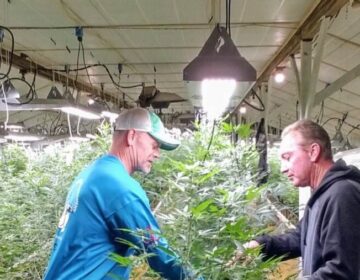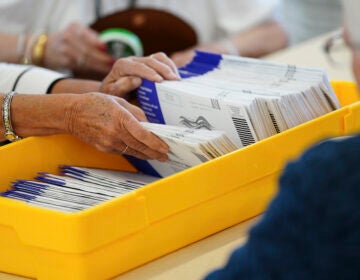Bill giving medical dispensaries first crack at recreational marijuana growing faces opposition in Del. House committee
Some opponents say the license fees are not substantial enough and the proposal could hurt the current supply of medical cannabis.
Listen 1:01
A cannibis plant that is close to harvest grows June 17, 2021. (AP Photo/Steve Helber)
From Philly and the Pa. suburbs to South Jersey and Delaware, what would you like WHYY News to cover? Let us know!
Legislation allowing medical cannabis dispensaries to start growing recreational marijuana before other entrants got a cool reaction from some in a House committee Tuesday.
The bill, sponsored by State Rep. Ed Osienski (D-Newark), would allow medical retailers to obtain a temporary conversion license, enabling them to legally sell both medical and recreational marijuana out of their existing facilities before new applicants complete the lottery process, where there’s a cap on licenses.
The bill received five yes votes from the eight members who voted on it, but Rep. William Bush, chairman of the House Economic Development, Banking, Insurance and Commerce Committee, said he would “walk the bill” to see if he could get the seven votes needed to release it from the committee.
Some cannabis advocates oppose the bill, saying it would give medical marijuana operators a leg up in the new industry. Others say the fees are too small or are not structured appropriately.
Currently, people over the age of 21 in Delaware can possess up to an ounce, but can’t legally buy in the state unless issued a medical cannabis card.
Osienski said the conversion license proposal will help open the recreational market to customers faster.
“Part of the real issue is brand new cultivation takes a lot of time,” he told the committee members. “Once a license is issued and once they establish a facility, it takes a long time to fit that facility out with the required infrastructure. And it takes a year to 18 months to get an established crop going, ready to be picked and issued. This utilizes the existing growth facilities,” he said.
Zoë Patchell, executive director and co-founder of Delaware Cannabis Advocacy Network, said her members are concerned the legislation prioritizes medical marijuana operators over new applicants into the market.
“This bill will allow six businesses to basically skip the line and get guaranteed licenses when everyone else will likely be subjected to the lottery process where they may not get a license at all, and they certainly won’t get their application fees back if they’re not selected,” she said.
Marijuana Deputy Commissioner Paul Hyland said the state plans to prevent medical providers from completely dominating the market by holding recreational sales until some applicants going through the lottery system open their doors. That means while compassionate care can start cultivating through these licenses, they won’t be able to sell it until Marijuana Commissioner Rob Coupe approves it.
The bill says the commissioner may begin accepting license applications from compassionate care centers from Aug. 1 through Nov. 1. They are valid for 48 months. Lottery applicants can start applying in September for licenses. The conversion licenses won’t impact the 125 licenses already set aside for cultivators, manufacturers and operators, Hyland said.
Last year’s legislation legalizing recreational marijuana originally allowed medical dispensaries to launch recreational sales, but it was removed due to pushback from medical customers worried about shortages. Patchell and others had opposed that provision because of market competition concerns.
Hyland said they were following New Jersey and Maryland’s models. When those states legalized retail sales of recreational marijuana, they first approved medical dispensaries to sell recreationally.
“This bill sort of creates that pathway. Without it, they could have participated in the application process, but there was no guarantee,” he said. “Many of them have laid out millions of dollars, and they could have been basically left out of the process.”
Under the legislation, the licenses would allow medical marijuana compassion centers to apply for conversion licenses if they met certain conditions, including showing they can meet the medical market demands, continue to provide medical services and support the social equity program.
The conversion license fee would be $100,000 for each license, with the proceeds earmarked to help social equity applicants holding a conditional license. Osienski said that would raise $3.2 million for the social equity fund. He said he would also seek $2 million from lawmakers to add to the fund.
Some committee members and public speakers questioned why medical dispensaries would be allowed to spread the payment of the conversion license fee over 18 months if the money was going to go to help people disproportionately affected by marijuana law enforcement activities.
Attorney and advocate Adam Windett said the bill was economic protectionism.
“It’s actually a system that facilitates a business decision by these companies to delay payments to prevent companies from having the capital to enter the market,” he said. “So you’re giving these companies the power to control whether new companies enter the market.”
New Castle marijuana advocate Rich Jester said he believes the medical cannabis operators should be charged $5 million per facility because of the high cost of entry for social equity applicants and $1 million for a renewal fee. Delaware’s medical marijuana market is currently worth around $54 million a year, according to the commissioner’s office. The office has said it anticipates a $200 million annual market for recreational weed.
There are 47 social equity licenses for people who have lived five of the past 15 years in an area of the state disproportionately impacted by high levels of marijuana crime enforcement or have been convicted of a low-level pot offense, as long as it did not involve selling to minors. Those include 20 for cultivation, 10 for product manufacturing, 15 for retail and two for testing.
“These dispensaries, they can afford this,” Jester said. “So at the end, if we say you need to pay $5 million to open a recreational [business] and they can’t lobby it or they lobby and fail, they’re going to pay it because the potential profit is so much greater than that.”
Legislation moving Delaware from a competitive scoring system to a lottery is headed to the governor’s desk. It passed the Senate on Tuesday 16-5. The House approved it in March on a 29-10 vote.

Get daily updates from WHYY News!
WHYY is your source for fact-based, in-depth journalism and information. As a nonprofit organization, we rely on financial support from readers like you. Please give today.






